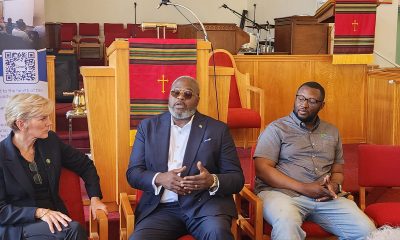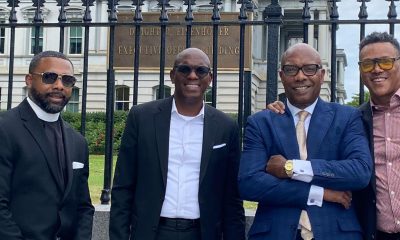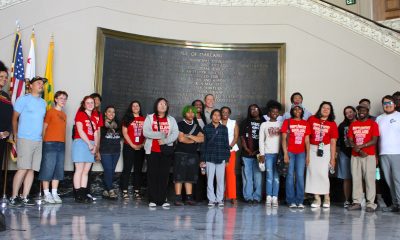Activism
Mayor Schaaf Speaks at Rally Blaming Teachers for Not Reopening Schools Immediately
“The rally featured the mayor,” though most of those there “were not even from Oakland,” said Davey D Monday afternoon on his radio show, “Hard Knock Radio.”
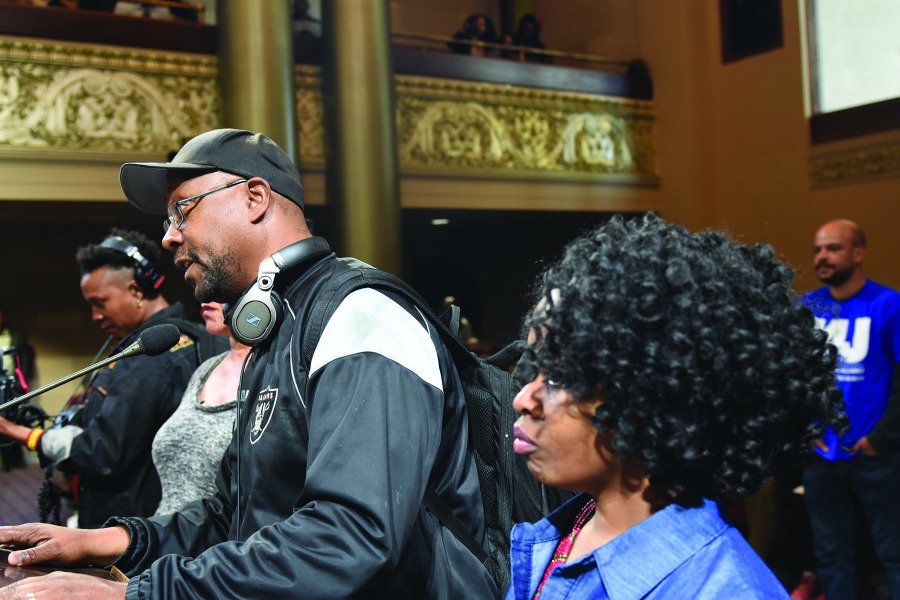
Oakland Mayor Libby Schaaf was the featured speaker at a rally Lake Merritt Sunday of 100-150 mostly white participants. Many of those at the supposedly “grassroots” protest blamed teachers and the teachers’ union for the failure to reopen schools immediately in the midst of the waning but still virulent pandemic that is claiming lives in Oakland.
“It’s time we get our kids back to school, or as we say in Oakland ‘hella time,’” said Schaaf. “Us adults have to get our stuff out of the way so we can put our children first,” she said in remarks quoted in the San Francisco Chronicle and other media.
The organization sponsoring the rally was called, in social media, “Oakland Parents for Transparency and Safe Reopening.”
Witnessing the Lake Merritt rally and the mayor’s participation in it were Davey D Cook, hip-hop activist and KPFA radio host; and local artist, activist and educator Kev Choice.
“The rally featured the mayor,” though most of those there “were not even from Oakland,” said Davey D Monday afternoon on his radio show, “Hard Knock Radio.”
“It was interesting to see this rally had nobody Black there,” though hundreds and hundreds of Black people were at the lake only a short distance away from where the rally was being held, he said.
Kev Choice, speaking on the radio show, said, “I was taken aback by the demographics of the rally” and particularly upset by two prominent placards he saw at the rally: “End Oakland Teacher Supremacy” and “Teacher Union Delay Kills Kids.”
“If they want to hold a rally, where are the families and students from the Oakland’s Black and Brown schools?” asked Choice. “Where are the kids from the Deep East?” “Why did they choose to have (the rally) at the lake, which is such a multicultural place of gathering, especially on Sunday.”
He said he was disappointed that the mayor was supporting this crowd, which was not representative of Oakland’s most impacted families and teachers.
“Are (they) considering those schools that are going to need more resources to reopen?” Choice asked.
Most of the polls and interviews in Oakland and other urban districts indicate that the majority of parents and teachers – unlike families from affluent districts – are opposed to reopening schools until there are sufficient guarantees of student, teacher and family safety.
Referring to the rally on social media in the “Mayor’s Weekly Briefing,” Schaaf wrote , “We joined with kids, parents, educators and residents to urge collaboration among our school district, unions and state officials to speed the process and reopen our schools in a safe and equitable manner.”
Joining the mayor in calling for the district to reopen were former school board member Jumoke Hinton-Hodge and current school board member Cliff Thompson.
One of the speakers was Megan Bacigalupi, who said “in-person education” is “essential,” arguing that Oakland is in the midst of “a sea of open or soon-to-be-open school districts,” comparing OUSD to neighboring highly affluent districts that have reopened, such as Piedmont and Orinda.
Bacigalupi is an attorney who works full time for the OUSD Parents organization and the statewide advocacy group Open School CA, according to the San Francisco Chronicle.
Davey D interviewed Mike Hutchison, a new school board member representing District 5, who emphasized that the district has been closed to in-person instruction for almost a year and is facing a serious crisis because it needs a concrete plan to reopen safely.
At the same time, he said there is a “concerted effort” to “rev up a small segment of parents” by some well-funded organizations “that are not friendly to public education” and oppose teacher unions.
CDC guidelines do say that schools can be reopened safely, according to Hutchinson, but also make clear that in order to do so, schools must made safe for students, including social distancing and other safeguards.
Oakland schools, which normally have nearly 30 or more students per classroom, would have to reduce to 12 students per class in order to maintain proper social distancing, requiring more classroom space and hiring more teaching staff.
“We do not have the space or the staff,” Hutchinson said. “We cannot afford it.”
He and others strongly disagree with those who favor reopening immediately who say a 1% fatality rate of school district staff and families would be an acceptable loss, Hutchinson said.
“That would be 350 students and 25 teachers,” who would die, he said. “That is not acceptable.”
“Our mayor controls enough money that she could help speed up the reopening of our schools,” he said. “Instead, she chose to (promote) a group of selfish parents and throw the rest of the district under the bus.”
Activism
Oakland Post: Week of July 24 – 30, 2024
The printed Weekly Edition of the Oakland Post: Week of July 24 – 30, 2024

To enlarge your view of this issue, use the slider, magnifying glass icon or full page icon in the lower right corner of the browser window. ![]()
Activism
Oakland Post: Week of July 17 -23, 2024
The printed Weekly Edition of the Oakland Post: Week of July 17 -23, 2024

To enlarge your view of this issue, use the slider, magnifying glass icon or full page icon in the lower right corner of the browser window. ![]()
Activism
Community Celebrates Historic Oakland Billboard Agreements
We, the Oakland Billboard Economic Development Coalition, which includes Oakland’s six leading community health clinics, all ethnic chambers of commerce, and top community-based economic development organizations – celebrate the historic billboard agreements approved last year by the Oakland City Council. We have fought for this opportunity against the billboard monopoly, against Clear Channel, for five years. The agreements approved by Council set the bar for community benefits – nearly $70 Million over their lifetime, more than 23 times the total paid by all previous Clear Channel relocation agreements in Oakland combined.
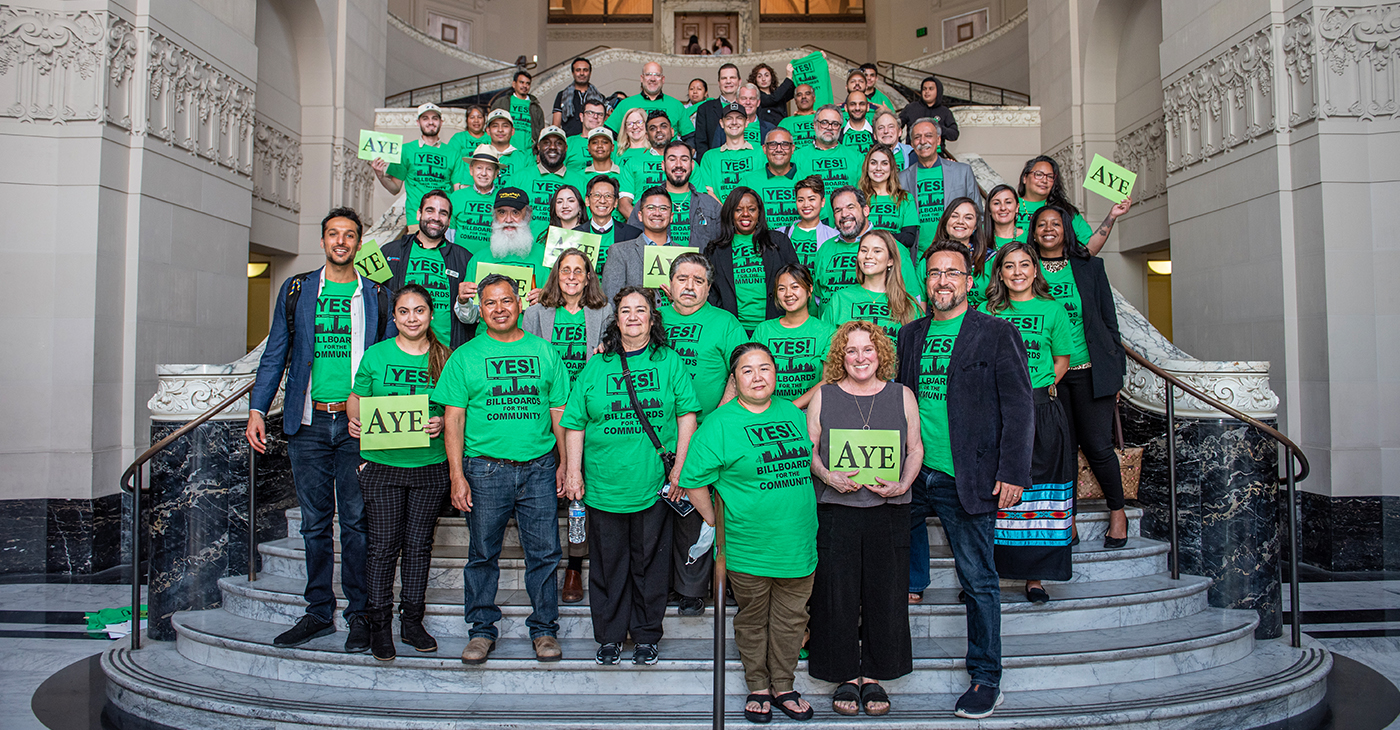
Grand Jury Report Incorrect – Council & Community Benefit
We, the Oakland Billboard Economic Development Coalition, which includes Oakland’s six leading community health clinics, all ethnic chambers of commerce, and top community-based economic development organizations – celebrate the historic billboard agreements approved last year by the Oakland City Council. We have fought for this opportunity against the billboard monopoly, against Clear Channel, for five years. The agreements approved by Council set the bar for community benefits – nearly $70 Million over their lifetime, more than 23 times the total paid by all previous Clear Channel relocation agreements in Oakland combined.
Unfortunately, a recent flawed Grand Jury report got it wrong, so we feel compelled to correct the record:
- Regarding the claim that the decision was made hastily, the report itself belies that claim. The process was five years in the making, with two and a half years from the first City Council hearing to the final vote. Along the way, as the report describes, there were multiple Planning Commission hearings, public stakeholder outreach meetings, a Council Committee meeting, and then a vote by the full Council. Not only was this not hasty, it had far more scrutiny than any of the previous relocation agreements approved by the City with Clear Channel, all of which provide 1/23 of the benefits of the Becker/OFI agreements approved by the Council.
- More importantly, the agreements will actually bring millions to the City and community, nearly $70M to be exact, 23 times the previous Clear Channel relocation agreements combined. They certainly will not cost the city money, especially since nothing would have been on the table at all if our Coalition had not been fighting for it. Right before the decisive City Council Committee hearing, in the final weeks before the full Council vote, there was a hastily submitted last-minute “proposal” by Clear Channel that was debunked as based on non-legal and non-economically viable sites, and relying entirely on the endorsement of a consultant that boasts Clear Channel as their biggest client and whose decisions map to Clear Channel’s monopolistic interests all over the country. Some City staff believed these unrealistic numbers based on false premises, and, since they only interviewed City staff, the Grand Jury report reiterated this misinformation, but it was just part of Clear Channel’s tried and true monopolistic practices of seeking to derail agreements that actually set the new standard for billboard community benefits. Furthermore, our proposals are not mutually exclusive – if Clear Channel’s proposal was real, why had they not brought it forward previously? Why have they not brought it forward since? Because it was not a real proposal – it was nothing but smoke and mirrors, as the Clear Channel’s former Vice President stated publicly at Council.
Speaking on behalf of the community health clinics that are the primary beneficiaries of the billboard funding, La Clinica de la Raza CEO Jane Garcia, states: “In this case, the City Council did the right thing – listening to the community that fought for five years to create this opportunity that is offering the City and community more than twenty times what previous billboard relocation agreements have offered.”
Oakland Billboard Economic Development Coalition
| Native American Health Center | La Clínica de la Raza | West Oakland Health Center |
| Asian Health Services | Oakland LGBTQ Center | Roots Community Health Center |
| The Unity Council | Black Cultural Zone | Visit Oakland |
| Oakland African American Chamber of Commerce | Oakland Chinatown Chamber of Commerce | Oakland Vietnamese Chamber of Commerce |
| Oakland Latino Chamber of Commerce | Building Trades of Alameda County | (partial list) |
-

 Arts and Culture3 weeks ago
Arts and Culture3 weeks agoRooted in Tradition: The Intricate History of Black Hair Braiding
-

 Bay Area4 weeks ago
Bay Area4 weeks ago“I Will Not Be Bullied,” Says Oakland Mayor Sheng Thao
-

 Bay Area2 weeks ago
Bay Area2 weeks agoPG&E Increases Rates While Bay Area Households Are Struggling to Stay Afloat
-

 Business3 weeks ago
Business3 weeks agoGov Newsom: Raising Fast Food Minimum Wage to $20 Pays Off as Jobs Multiply in Industry
-

 Activism4 weeks ago
Activism4 weeks agoOpponents of Mayor Sheng Thao Are Calling on Her to Resign Following FBI Raid
-

 Bay Area2 weeks ago
Bay Area2 weeks agoJuneteenth Mass Shooting Suspect Charge with Multiple Counts of Felony Assault by Alameda County DA Pamela Price
-

 Community1 week ago
Community1 week agoHundreds Come to Jehovah’s Witnesses’ Assembly Hall for Three-Day Program of ‘Good News’ in Fremont
-

 Activism4 weeks ago
Activism4 weeks agoOakland Coliseum Sale to AASEG: A Model for Community Development and Inclusion





